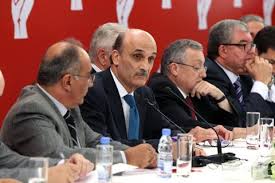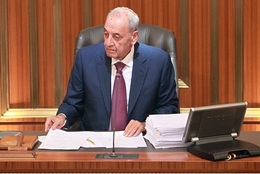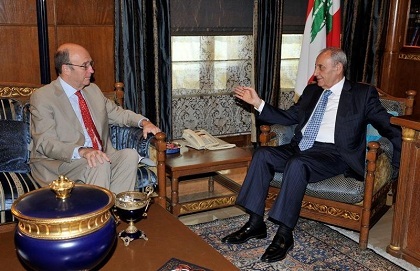International representative made contacts with a number of the forces of the “March 14” alliance, advising them to proceed with Berri’s formula and to be satisfied with the amendments that have been achieved already
What did Berri tell the head of the “Future Movement” via “SMS”?
Imad Marmal
Even though all the weapons of the Arabic language have been plunged in the battle on the resistance formula in the ministerial statement, the smoke of the terms that were burning during negotiations, of course, does not hide the essence of the fact that the dispute was not on the chosen words but on strategic options that are related to the identity of Lebanon and its location.
 Perhaps the nature of the amendments that the “March 14” alliance requested to make to Parliament Speaker Nabih Berri’s formula gives a clear indication that there are “two mentalities” simulating the Israeli risks and the ways to address them.
Perhaps the nature of the amendments that the “March 14” alliance requested to make to Parliament Speaker Nabih Berri’s formula gives a clear indication that there are “two mentalities” simulating the Israeli risks and the ways to address them.
On the sidelines of a lunch banquet thrown by President Michel Sleiman in honor of his Finnish counterpart, Berri told Sleiman frankly: “Your Excellency Mr. President, I’m trying to delude myself that the issue is related to the words chosen and the language interpretations, but neither you nor I believe that this is the truth, however, I will continue to seek consensus”.
Berri seemed to be convinced that any possible compromise on the ministerial statement will not be developed before ending the March 14 alliance commemoration ceremony that was held last Friday, knowing that addressing the audience in such occasions necessitates stepping the rhetoric up.
In the course of events, Berri wanted to inform former Prime Minister Saad al-Hariri, in his own way, that he “understands him”, so he asked his media adviser Ali Hamdan to send via his cell phone SMS to al-Hariri, through the cell phone of his office manager Nader, which includes the famous proverb from a European philosopher: “Truth from this side of the Pyrenees, error on the other side”, (the Pyrenees Mountains).
Furthermore, Berri addressing al-Hariri via the “SMS” added: “Then, how was the case before March 14? After it, May God help you, there will be a ministerial statement”.
Berri had written by his own hand a draft version of the resis tance clause on a small sheet of paper, and then with the progress of the negotiations he started to put a red line under the words that the “March 14” coalition asked to amend. The coalition did not endorse the resistance as “a sincere and natural expression for the Lebanese people”, and called for replacing the term “the safety of Lebanon” with “the safety of its citizens”, and considered that there is no need to refer to the “Israeli greediness” and to “Lebanon’s right to its water and oil”.
tance clause on a small sheet of paper, and then with the progress of the negotiations he started to put a red line under the words that the “March 14” coalition asked to amend. The coalition did not endorse the resistance as “a sincere and natural expression for the Lebanese people”, and called for replacing the term “the safety of Lebanon” with “the safety of its citizens”, and considered that there is no need to refer to the “Israeli greediness” and to “Lebanon’s right to its water and oil”.
The “March 14” alliance tried vainly to limit the powers of the Resistance and Liberation sometimes by mentioning “the government and its citizens” and other times by referring to “the state and its citizens”. Yet, this attempt has failed because stating the words “the citizens” may be explained on the grounds as a synonym to the elements of the security institutions specifically. Consequently, the “March 14” alliance sought to link the right of the resistance to the “citizens” exclusively, but some of the “March 8” alliance negotiators had serious suspicions, because this could imply that the citizens of this or that town are only the ones concerned to defend their town in the face of any Israeli attack, what required adding the word “Lebanese” to the word “citizens”.
The “March 8” alliance kept pace with the other side superficially and succeeded thoroughly, where some of the “March 14” hawks started to pity the “Army-People-Resistance” equation, though former Prime Minister al-Hariri considers that it has gone forever.
Despite the fact that the political language settlement regarding the resistance clause in the ministerial statement has left the Cabinet Room in the Baabda Palace, the real driving force that made some of the “March 14” leaders respond to the settlement came from outside the palace, and even from outside the boundaries. This comes after it seemed that there was a crucial international decision stressing the need for completing the legitimacy of the government, through completing its ministerial statement and gaining the confidence of the House of Representatives, in addition to the desire of the international community to maintain a minimum level of cohesion and stability in Lebanon, after it turned into the most prominent “environment embracing” the displaced Syrians.
 This international climate has been reflected by the Personal Representative of the Secretary-General of the United Nations in Beirut Derek Plumbly, who demanded hastily, during negotiations on the ministerial statement, to meet Berri. Plumbly tried to relieve the stress caused by the “March 14” requests, to discuss the possibility of removing the article “the” when mentioning the resistance, and to assign the right of liberation to “the state and its citizens”, calling his interlocutor’s attention to the fact that things are almost going to reach to an end, that the world is waiting, and that the government will basically stay for a short period of time. Then the decisive response came from the Parliament Speaker who refused to waive the constants concerning the role of the resistance.
This international climate has been reflected by the Personal Representative of the Secretary-General of the United Nations in Beirut Derek Plumbly, who demanded hastily, during negotiations on the ministerial statement, to meet Berri. Plumbly tried to relieve the stress caused by the “March 14” requests, to discuss the possibility of removing the article “the” when mentioning the resistance, and to assign the right of liberation to “the state and its citizens”, calling his interlocutor’s attention to the fact that things are almost going to reach to an end, that the world is waiting, and that the government will basically stay for a short period of time. Then the decisive response came from the Parliament Speaker who refused to waive the constants concerning the role of the resistance.
Before the 20-minute meeting came to an end, the phone rang in the Parliament Speaker’s office. The Minister of Finance Ali Hassan Khalil was on the line informing Berri about the last propositions by the “March 14” alliance to regulate the relationship between the resistance and the state. Berri using a firm tone of voice, in front of his gust, rejected any attempt to circumvent the constants of the formula provided by him. At that moment, Plumbly realized that the Parliament Speaker’s margin of flexibility has narrowed to the maximum and that it is no longer possible to ask him to collaborate any further.
Plumbly asked permission to leave, and told the Parliament Speaker: “I will inform the journalists that I discussed with you the affairs related to the Paris conference on the displaced Syrians”. Later, the international representative made contacts with a number of the forces of the “March 14” alliance, advising them to proceed with Berri’s formula and to be satisfied with the amendments that have been achieved already.
On the other hand, other canals have been opened between the leaders of the “March 14” alliances and the U.S. ambassador in Beirut, David Hale, who was “found” in Germany after looking for him, and the advice was also to facilitate the birth of the ministerial statement.
In fact, the issue of the resistance clause in the statement was also present during the meeting between Parliament Speaker Berri and one of the Western ambassadors accredited to Beirut. Berri stressed to his guest that the “resistance is not limited to Hezbollah, but has went through several phases, where Syrian communists, Baathists, and nationalists had previously participated in it, and the Amal movement has alone provided a thousand martyrs”.
Berri told the Western Ambassador: “If you have reservations or specific considerations related to your position on Hezbollah and its involvement in the fighting in Syria, then it’s up to you. As for the resistance itself, it belongs to a large segment of the Lebanese people, even if Hezbollah has developed it in the phase that has its signature”.
Translated by: Maysa Hazimeh
